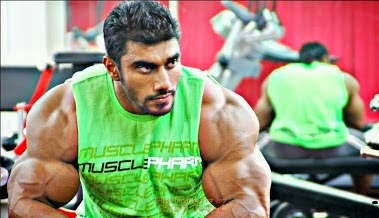Proteins Chart
|
#1 Sun-Dried Tomatoes
|
258 calories
|
Protein:14%
|
Carb: 56%
|
Fat: 2%
|
Other (water):28%
|
|
#2 Soybean Sprouts
|
125 calories
|
Protein:13%
|
Carb: 9%
|
Fat: 7%
|
Other (water):71%
|
|
#3 Winged Beans
|
148 calories
|
Protein:12%
|
Carb: 28%
|
Fat: 1%
|
Other (water):59%
|
|
#4 Lentil Sprouts
|
106 calories
|
Protein:9%
|
Carb: 22%
|
Fat: 0%
|
Other (water):69%
|
|
#5 Baby Lima Beans
|
132 calories
|
Protein:8%
|
Carb: 25%
|
Fat: 0%
|
Other (water):67%
|
|
#6 Garlic
|
149 calories
|
Protein:6%
|
Carb: 33%
|
Fat: 0%
|
Other (water):61%
|
|
#7 Dried Seaweed(Sushi Nori)
|
306 calories
|
Protein:6%
|
Carb: 81%
|
Fat: 0%
|
Other (water):13%
|
|
#8 Grape Leaves
|
93 calories
|
Protein:6%
|
Carb: 17%
|
Fat: 1%
|
Other (water):76%
|
|
#9 Green Peas
|
77 calories
|
Protein:5%
|
Carb: 14%
|
Fat: 0%
|
Other (water):81%
|
|
#10 Succotash(Corn And Limas)
|
115 calories
|
Protein:5%
|
Carb: 24%
|
Fat: 1%
|
Other (water):70%
|
|
#11 Wasabi Root
|
109 calories
|
Protein:5%
|
Carb: 24%
|
Fat: 0%
|
Other (water):71%
|
|
#12 Portabella Mushrooms
|
35 calories
|
Protein:4%
|
Carb: 5%
|
Fat: 0%
|
Other (water):91%
|
|
#13 Spinach
|
34 calories
|
Protein:4%
|
Carb: 5%
|
Fat: 1%
|
Other (water):90%
|
|
#14 Alfalfa Sprouts
|
23 calories
|
Protein:4%
|
Carb: 2%
|
Fat: 1%
|
Other (water):93%
|
|
#15 Peas And Onions
|
70 calories
|
Protein:4%
|
Carb: 14%
|
Fat: 0%
|
Other (water):82%
|
|
#16 White Mushrooms
|
44 calories
|
Protein:4%
|
Carb: 6%
|
Fat: 0%
|
Other (water):90%
|
|
#17 Broccoli Raab
|
33 calories
|
Protein:4%
|
Carb: 3%
|
Fat: 0%
|
Other (water):93%
|
|
#18 Straw Mushrooms
|
32 calories
|
Protein:4%
|
Carb: 5%
|
Fat: 0%
|
Other (water):91%
|
|
#19 Brussels Sprouts
|
41 calories
|
Protein:4%
|
Carb: 8%
|
Fat: 0%
|
Other (water):88%
|
|
#20 Balsam-Pear (Bitter Gourd)
|
34 calories
|
Protein:4%
|
Carb: 7%
|
Fat: 0%
|
Other (water):89%
|
|
#21 Podded Peas
|
52 calories
|
Protein:4%
|
Carb: 9%
|
Fat: 0%
|
Other (water):87%
|
|
#22 Shiitake Mushrooms
|
48 calories
|
Protein:3%
|
Carb: 8%
|
Fat: 0%
|
Other (water):89%
|
|
#23 Peas And Carrots
|
53 calories
|
Protein:3%
|
Carb: 11%
|
Fat: 0%
|
Other (water):86%
|
|
#24 Turnip Greens
|
29 calories
|
Protein:3%
|
Carb: 5%
|
Fat: 0%
|
Other (water):92%
|
|
#25 Sweet Corn
|
108 calories
|
Protein:3%
|
Carb: 25%
|
Fat: 1%
|
Other (water):71%
|
|
#26 Oyster Mushrooms
|
43 calories
|
Protein:3%
|
Carb: 6%
|
Fat: 0%
|
Other (water):91%
|
|
#27 Kale
|
50 calories
|
Protein:3%
|
Carb: 10%
|
Fat: 0%
|
Other (water):87%
|
|
#28 Artichokes (Globe Or French)
|
47 calories
|
Protein:3%
|
Carb: 11%
|
Fat: 0%
|
Other (water):86%
|
|
#29 Chives
|
30 calories
|
Protein:3%
|
Carb: 4%
|
Fat: 1%
|
Other (water):92%
|
|
#30 Asparagus
|
24 calories
|
Protein:3%
|
Carb: 4%
|
Fat: 0%
|
Other (water):93%
|
|
#31 Broccoli
|
28 calories
|
Protein:3%
|
Carb: 5%
|
Fat: 0%
|
Other (water):92%
|
|
#32 Cauliflower
|
32 calories
|
Protein:3%
|
Carb: 6%
|
Fat: 0%
|
Other (water):91%
|
|
#33 Collards
|
36 calories
|
Protein:3%
|
Carb: 7%
|
Fat: 0%
|
Other (water):90%
|
|
#34 Parsley
|
36 calories
|
Protein:3%
|
Carb: 6%
|
Fat: 1%
|
Other (water):90%
|










